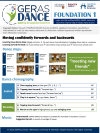Development of GERAS DANcing for Cognition and Exercise (DANCE): a feasibility study
- PMID: 35045863
- PMCID: PMC8767754
- DOI: 10.1186/s40814-021-00956-3
Development of GERAS DANcing for Cognition and Exercise (DANCE): a feasibility study
Abstract
Background: Dance is a mind-body activity of purposeful rhythmic movement to music. There is growing interest in using dance as a form of cognitive and physical rehabilitation. This manuscript describes the development of GERAS DANcing for Cognition and Exercise (DANCE) and evaluates its feasibility in older adults with cognitive and mobility impairments.
Methods: The progressive dance curricula were delivered for 15 weeks (1-h class; twice weekly). Participants were eligible if they were community-dwelling older adults aged 60+ with early cognitive or mobility impairment able to follow three-step commands and move independently. Feasibility outcomes included recruitment/retention, adherence, participant satisfaction, safety, and adverse events.
Results: Twenty-five older adults (mean (standard deviation [SD]) age = 77.55 (6.10) years, range 68-90 years) with early cognitive (Montreal Cognitive Assessment score (SD) = 21.77 (4.05)) and mobility (92% were pre-frail/frail as indicated on the Fried Frailty Phenotype) impairments were recruited from a geriatric out-patient clinic or within the community. A total of 20/25 (80%) participants completed the study. Average class attendance was 72%, and self-reported homework adherence "most-days / every day" was 89%. A stepwise progression in the dance curricula was observed with increases in motor complexity and balance demands, and 95% of participants rated the program as a "just-right" challenge. Ninety percent of participants rated GERAS DANCE as excellent, and 100% would recommend the program to a friend or family member. Over 50% of participants connected outside of class time for a self-initiated coffee club. Adverse events of falls and fractures were reported for 2 participants, which occurred at home unrelated to the dance intervention during the study period. Pre-determined thresholds for feasibility were met for all outcomes.
Discussion: GERAS DANCE is a feasible and enjoyable program for older adults with early cognitive or mobility impairments. GERAS DANCE curriculum grading (duration; sequence; instructions) and motor complexity increases in agility, balance, and coordination appear appropriately tailored for this population. Future work will explore the feasibility of GERAS DANCE in new settings (i.e., virtually online, community centers, or retirement homes) and the mind-body-social benefits of dance.
Keywords: Cognition; Dance; Frailty; Geriatrics; Rehabilitation.
© 2022. The Author(s).
Conflict of interest statement
PH, CK, GI, and AP are co-developers of the GERAS DANCE intervention with McMaster University with a registered Canadian Copyright #
Figures
References
-
- Statistics Canada . A portrait of the population aged 85 and older in 2016 in Canada. 2017.
Grants and funding
LinkOut - more resources
Full Text Sources
Miscellaneous




